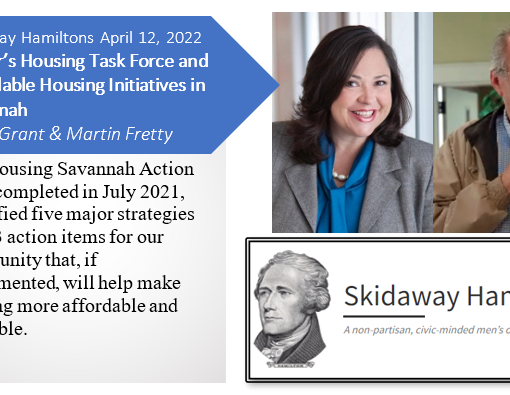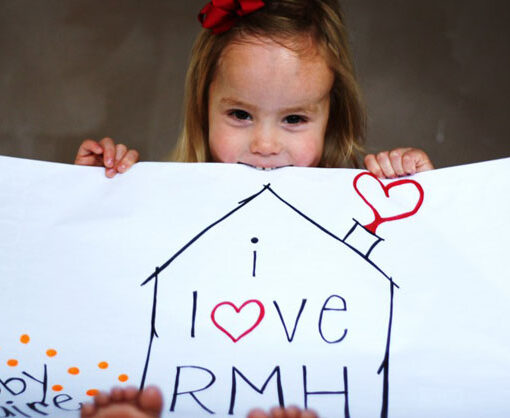Meeting Recap Bill Broker and Shaina Thompson, Georgia Legal Services
Evictions: Landlord-Tenant Issues in Savannah
 Bill Broker, the Managing Attorney in the Savannah regional office at Georgia Legal Services (GLS), and Shaina Thompson, the Eviction Prevention Project Attorney for GLS, spoke via Zoom to a group of Skidaway Hamiltons and Abigails on December 14. Mr. Broker explained that GLS is a private, non-profit public interest law firm that provides access to the court system for those unable to pay for legal services. All work is on civil cases. The Savannah office handles Chatham County and ten other counties near the Georgia coast. Many cases are domestic violence cases where GLS represents primarily female victims who have no resources to pay for legal representation in obtaining protective court orders.
Bill Broker, the Managing Attorney in the Savannah regional office at Georgia Legal Services (GLS), and Shaina Thompson, the Eviction Prevention Project Attorney for GLS, spoke via Zoom to a group of Skidaway Hamiltons and Abigails on December 14. Mr. Broker explained that GLS is a private, non-profit public interest law firm that provides access to the court system for those unable to pay for legal services. All work is on civil cases. The Savannah office handles Chatham County and ten other counties near the Georgia coast. Many cases are domestic violence cases where GLS represents primarily female victims who have no resources to pay for legal representation in obtaining protective court orders.
Ms. Thompson spoke on the topic of evictions and the evictions process. She said that evictions result primarily from non-payment of rent. Tenants have two options: claiming a repair issue that might reduce the rent owed or invoking the tender defense. The tender defense must be asserted within seven days of the warrant, as must any defense to a dispossessory warrant, and can only be used once in a twelve-month period, and requires that all rent plus court fees be paid within that seven-day period to get the dispossessory warrant dismissed. Rental assistance comes from local sources, including the United Way, the Economic Opportunity Authority of Savannah/Chatham County (EOA), Family Promise, and the Salvation Army, and from a statewide source, the Georgia Department of Community Affairs (DCA).
GLS works with tenants and landlords to try to avoid a court hearing. It has started a program with the mayor’s office to send non-payment issues to the local mediation service to negotiate settlements without involving the court. The mediation office has direct access to the rental assistance programs and can often resolve issues quickly. Ms. Thompson stressed that avoiding an eviction is critical because eviction orders in Georgia stay on the tenant’s record forever and future landlords may refuse to rent to these tenants. Evictions are also costly for the landlord.
Rental assistance is limited. For example, the United Way currently is taking only twenty-five assistance cases a week on a first come-first served basis. Time is very limited for tenants to avoid eviction in a non-payment case. Once an eviction is requested by a landlord, the tenant is served by the sheriff either in person or by “tack and mail,” meaning a notice is tacked to the front door of the unit. The seven-day period for any defense begins with the serving of this notice. At the end of the seven days, if no defense is filed, the eviction will be granted. If a defense is filed and the Court finds against the tenant, there is another seven-day period for filing an appeal. GLS works closely with the rental assistance agencies and can sometimes expedite payments within that seven-day period. It also works closely with landlords. Some landlords are willing to accept the rental assistance agencies’ promise to pay even though it may take more than seven days. Some will not wait.
Mr. Broker stressed that landlord/tenant laws in Georgia are very much in favor of the landlords. Most tenants cannot respond within seven days, and the Georgia legislature has even considered shortening that time to five days. The eviction moratorium was very helpful in providing some breathing room for tenants, particularly in Savannah where many landlords have been reasonably flexible about accepting promises to pay by rental assistance agencies. That has been much less true in rural counties where assistance must come from the statewide DCA program, which may take three to five months to respond. Mr. Broker also said that judges in Savannah have been serious about properly implementing the COVID moratorium on evictions and have done their best to schedule hearings in such a way that the chances of reaching a resolution between parties have been enhanced. That has not been the case in rural counties where judges are not necessarily lawyers.
In Q&A, Ms. Thompson said that most assistance now is month to month. COVID has caused many tenants to fall just a month or two behind as they deal with children being out of school or being furloughed or laid off from a job. Sometimes, they get a new job but don’t get paid for a week or two, compounding the problem. Affordable housing in Savannah is so limited that it is very difficult to find another housing unit and avoid homelessness.
Mr. Broker was asked how we Hamiltons and Abigails can help. He said some Landings folks have served as volunteer lawyers. Some have provided donations to GLS to help tenants with small amounts of rent to pay. Finally, the Federal money to support some of the attorneys at GLS will end soon and donations to try to hold on to such staff members would be very helpful.




